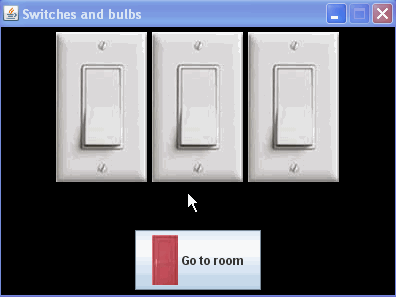Here is my switch bulb GUI program:
import javax.swing.JFrame;
import javax.swing.JPanel;
import javax.swing.JButton;
import javax.swing.JLabel;
import javax.swing.ImageIcon;
import javax.swing.SwingUtilities;
import java.awt.Color;
import java.awt.Rectangle;
import java.awt.CardLayout;
import java.awt.FlowLayout;
import java.awt.GridLayout;
import java.awt.BorderLayout;
import java.awt.event.ActionEvent;
import java.awt.event.ActionListener;
import java.awt.event.MouseEvent;
import java.awt.event.MouseAdapter;
public class SeventhProgram
{
public static void main(String[] args)
{
SwingUtilities.invokeLater(new Runnable() {
public void run() {
GUI program = new GUI("Switches and bulbs");
program.setSize(400,300);
program.setLocationRelativeTo(null);
program.setVisible(true);
}
});
}
}
class GUI extends JFrame implements Constants, ActionListener
{
JPanel cards;
JPanel card1, card2;
JPanel[] bulbPans = new JPanel[3];
JButton goToRoom, back;
JLabel[] switches = new JLabel[3];
ImageIcon switchonIMG, switchoffIMG;
JLabel[] bulbs = new JLabel[3];
boolean[] switchstate = new boolean[3];
public GUI(String arg)
{
super(arg);
setDefaultCloseOperation(JFrame.EXIT_ON_CLOSE);
setResizable(false);
init();
add(cards);
}
public void init()
{
initCard1();
initCard2();
setCards();
}
public void initCard1()
{
JPanel top = new JPanel(new FlowLayout(FlowLayout.CENTER));
JPanel bot = new JPanel(new FlowLayout(FlowLayout.CENTER));
card1 = new JPanel(new BorderLayout());
switchoffIMG = new ImageIcon("switch1.jpg", "OFF switch");
switchonIMG = new ImageIcon("switch2.jpg", "ON switch ");
for(int i=0; i<switches.length; i++)
switches[i] = new JLabel(switchoffIMG);
for(int i=0; i<switchstate.length; i++)
{
final int j = i;
switches[j].addMouseListener(new MouseAdapter(){
public void mouseClicked(MouseEvent e)
{
if(switchstate[j])
{
if(ON_RECTANGLE.contains(e.getX(), e.getY()))
switchstate[j] = false;
}
else
{
if(OFF_RECTANGLE.contains(e.getX(), e.getY()))
switchstate[j] = true;
}
paintStuff();
}
});
}
top.setBackground(Color.BLACK);
bot.setBackground(Color.BLACK);
for(int i=0; i<switches.length; i++)
top.add(switches[i]);
goToRoom = new JButton("Go to room", new ImageIcon("door_closed.jpg"));
goToRoom.addActionListener(this);
goToRoom.setRolloverIcon(new ImageIcon("door_open.jpg"));
bot.add(goToRoom);
card1.add(top, BorderLayout.CENTER);
card1.add(bot, BorderLayout.SOUTH);
}
public void initCard2()
{
JPanel top = new JPanel(new GridLayout(1, 0));
JPanel bot = new JPanel(new FlowLayout(FlowLayout.CENTER));
for(int i=0; i<bulbPans.length; i++)
{
bulbPans[i] = new JPanel();
bulbPans[i].setBackground(Color.BLACK);
}
card2 = new JPanel(new BorderLayout());
for(int i=0; i<bulbs.length; i++)
bulbs[i] = new JLabel(new ImageIcon("bulb.jpg", "Image of a bulb"));
bot.setBackground(Color.BLACK);
for(int i=0; i<bulbPans.length; i++)
top.add(bulbPans[i]);
paintStuff();
back = new JButton("Back to switches",new ImageIcon("door_closed.jpg"));
back.addActionListener(this);
back.setRolloverIcon(new ImageIcon("door_open.jpg"));
bot.add(back);
card2.add(top, BorderLayout.CENTER);
card2.add(bot, BorderLayout.SOUTH);
}
public void setCards()
{
cards = new JPanel(new CardLayout());
cards.add(card1, "CARD1");
cards.add(card2, "CARD2");
}
public void paintStuff()
{
for(int i=0; i<switchstate.length; i++)
{
if(switchstate[i])
bulbPans[i].add(bulbs[i]);
else
bulbPans[i].remove(bulbs[i]);
switches[i].setIcon(switchstate[i]?switchonIMG:switchoffIMG);
}
repaint();
}
public void actionPerformed(ActionEvent evt) {
CardLayout c = (CardLayout)(cards.getLayout());
c.next(cards);
}
}
interface Constants
{
final static Rectangle OFF_RECTANGLE = new Rectangle(30, 75, 35, 40);
final static Rectangle ON_RECTANGLE = new Rectangle(25, 35, 35, 30);
}
Output:

Is there any room for improvement?
